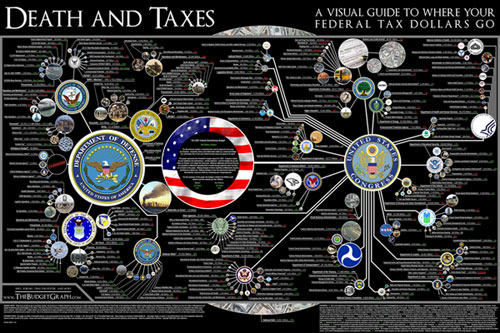This is way cool! Think Google Earth meets the US Federal Budget and you’ll begin to understand Jesse Bachman’s brainchild. In a single, mind-numbing graphic, Bachman presents the entire US discretionary budget (no national debt, no Medicare or Social Security) — everything the President and your representatives fight over year after year after year.
Organized by areas of authority, with dollar figures in print and shown grapically by the size of each department or project, this graphic really lets you get a handle on the massive scope of our federal government. Zoom in and pan to move from the Defense Department on the left to the various federal agencies on the right.
I’m already using it to compare spending across departments and agencies. How does the National Science Foundation’s budget compare with the Commerce Department, for instance?
You’ll need a high-speed connection to get good results from this site.
Thanks to Joe Carter at The Evangelical Outpost for the link.
Update: I’ve been trying to understand why I love this so. I’m not normally very interested in finances, but the federal budget is different. It really is the mother of all checking accounts, isn’t it? It grabs my attention because it’s BIG.
Senator William Proxmire used to give out his “Golden Fleece” award to the year’s most jaw-dropping example of wasteful federal spending. Proxmire saw himself as a champion of the ordinary citizen whose hard work provided the taxes that make possible this orgy of spending we call the Federal Government.
Once, during the budget cutting process, as he ruthlessly snipped away at spending requests, Proxmire famously noted: “A million here, a million there, and pretty soon you’re talking about real money!” He realized how that would sound at home, and the way the Washington culture numbs Congress to the value of money.
Government always grows, never shrinks. Most federal programs are far more wasteful than your worst-run private charity when you look at dollars spent on administration vs. dollars actually applied to the problems they are supposed to solve. There is little incentive to be efficient and frugal. There is great incentive to lobby for a piece of the pie.
I see the budget as an interesting sociological commentary on modern society and what we hold dear. We tax each other to fund the things we care passionately about.
I also see it as a modern morality play in which the actors, our Congressmen and Senators, are being driven by some of the same deadly sins that have troubled mankind since Adam and Eve: pride, greed, envy, and gluttony.



I don’t think about this more than I can help it; it’s upsetting, and I don’t see a path to changing it!